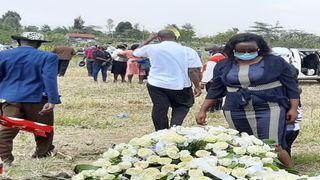
David Muraguri's grave.
| Mwangi Muiruri | Nation Media GroupMuranga
Premium
Was he a Covid-19 patient or victim of medical negligence?
What you need to know:
- David Muraguri's death triggered a row over his Covid-19 status, given a positive result test dated September 1 -- 29 days after he had been taken to a ward for coronavirus patients.
- The controversy even caught the attention of Afya House.
On the afternoon of July 31, this year, David Muraguri, 49, was involved in an accident on the Murang’a-Kenol road. The accident was initially thought as minor.
Except it wasn’t. The father of three would be dead in five days. And his death triggered a row over his Covid-19 status, given a positive result test dated September 1 -- 29 days after he had been taken to a ward for coronavirus patients.
The controversy even caught the attention of Afya House.
On the day of the accident, a Friday, the deputy principal of Thaara Secondary School in Murang’a County and three close friends were riding in his car.
One of the friends was behind the wheel, when, at the entry to Bishop Mahia-ini Primary School, he veered off the road while trying to avoid a head-on collision.
The vehicle overturned in a ditch.
They were all rushed to the nearby Maragua Level Four hospital.
After First Aid and preliminary examinations, their injuries were determined not life-threatening and they were all discharged.
However, they were booked for a clinical appointment for the following Monday, August 3.
By Sunday evening, he had blood-stained vomit.
“Over that weekend, my brother was not well. He was complaining of joint pains and by Sunday evening, he had blood-stained vomit. On Monday, Mr Muraguri went back to Maragua hospital,” his sister, Jemimah Njeri, told the Nation.
Mr Muraguri was admitted and isolated as a suspected Covid-19 patient.
Ms Njeri said samples were taken from her brother for testing, but before the results were out, he was transferred in an ambulance to Murang’a Level Five hospital, and booked into Covid-19 Ward Five.
According to the hospital’s medical superintendent, Dr Leonard Gikera, “Mr Muraguri was admitted as a suspected Covid-19 patient since he had classical symptoms associated with the disease.”
However, Dr Gikera offered that the admission was based purely on suspicion.
“This patient had a dry cough, had fever, was vomiting, had a headache … That was the report we had received from Maragua and we acted on the strength of that. We commenced efforts to manage his condition and unfortunately, on August 5, we lost him,” Dr Gikera explained.

David Muraguri.
It, however, raises questions why Mr Muraguri was isolated in a ward with Covid-19 patients before his status had been confirmed. He should have been placed in the ward only after his test results turned positive for coronavirus.
And Ms Njeri questioned why the medical report accompanying his referral did not disclose he was the victim of an accident, which could cause internal bleeding.
“There is no reference to any consideration that the patient had an accident three days prior to admission and the blood-stained vomit could have been as a result of internal bleeding,” she said.
Dr Gikera acknowledged the referral report had not indicated he was initially taken to hospital following an accident.
His family wonders how such a detail was missing from the medical report.
Even more puzzling is that even after Mr Muraguri was reported as a Covid-19 patient, no contact tracing has so far been conducted.
The nurses who were in close contact with him when he sought treatment after the accident, close family members and friends were not asked to isolate.
Dr Gikera termed the issue as “qualified medical interactive decision”.
Health County Executive Committee member Joseph Mbai and Director of Health Winnie Kanyi refused to be interviewed.
Seeking intervention
Ms Njeri said her brother had called, seeking her intervention as he was apprehensive about his treatment “and I made arrangements to have him transferred to Nairobi Hospital but the move was turned down by the hospital”.
Dr Gikera explained the Ministry of Health had banned Covid-19 patients being transferred to Nairobi.
He also added that admission to the intensive care unit is not always the best since intubation sometimes accelerates death of patients. “This is why we made a decision to have him remain in our high-dependency unit (HDU) here, referred to as Ward Five,” said Dr Gikera.
When Mr Muraguri died, his body lay at Murang’a hospital mortuary for one week.
He was buried on August 11. Ms Njeri again questioned why Ministry of Health officials during the burial were not in protective gear, common during burial of Covid-19 victims.
“We were advised to organise the burial normally. Gone was the Covid-19 risk. He was buried by public health officers from Nyeri County, who did not don personal protective equipment. Only one had gloves. This was a normal burial being forced to appear abnormal,” she remarked.
When the Nation saw the patient file, it had a Kenya Medical Research Institute Covid-19 sample test result dated September 1. That was 29 days after he had been suspected to be infected.
Health Cabinet Secretary Mutahi Kagwe on September 1 sent Ms Njeri a short message that read: “I am very sorry, sincere condolences. I am trying to get information from Murang’a.”
Our efforts to contact the CS for a comment on the matter were unsuccessful as he neither answered our calls nor responded to our text messages.





